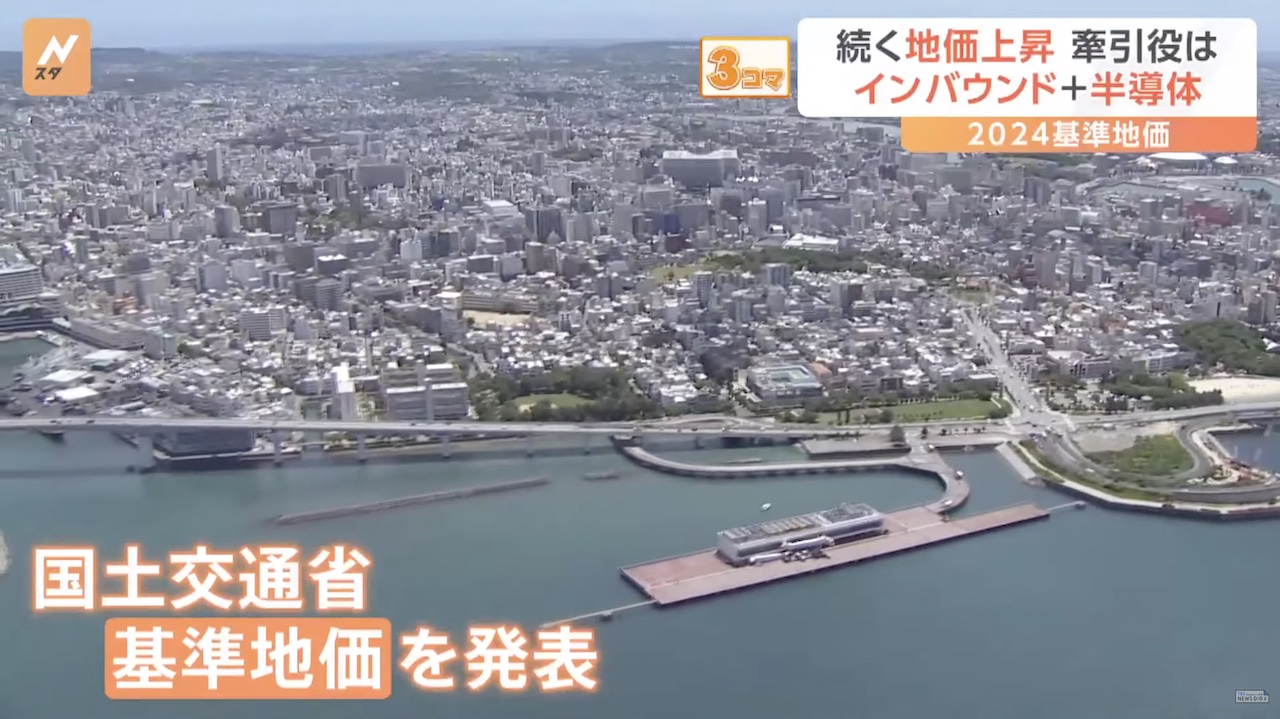TOKYO, Sep 17 (News On Japan) - Land prices across Japan have been rising for four consecutive years, with North Kanto emerging as a key area of interest due to its favorable living conditions.

The Ministry of Land, Infrastructure, Transport, and Tourism recently announced the 2024 benchmark land prices, which serve as an important indicator for land transactions nationwide. Notably, Onna Village in Okinawa saw the most significant increase in residential land prices, rising by 29%, driven by the influx of new residents, partly due to increased inbound tourism. Meanwhile, in commercial areas, Ozu Town in Kumamoto recorded a 33.3% rise, thanks to the expansion of Taiwanese semiconductor manufacturer TSMC.
Experts point out that areas with convenient transportation and a family-friendly environment tend to see more relocation, leading to land price hikes. Mika Kasamatsu, Deputy Editor of Suumo, highlighted that towns with easy accessibility and good childcare services are particularly attractive to families. Utsunomiya City in Tochigi Prefecture is one such example, where land prices have been increasing for four consecutive years. The city opened a next-generation light rail transit (LRT) system in August 2023, enhancing transportation options. Additionally, Utsunomiya has prioritized childcare, maintaining a "zero waitlist" for daycare for seven years and offering free medical care for children up to high school seniors.
With the growing acceptance of remote work, more people are choosing to live in areas outside city centers. Former Japan national swimmer Takeshi Matsuda noted that, for many families, deciding where to raise children and what kind of education they will receive is a strong motivator for relocation. Matsuda himself considered moving to a more spacious area outside Tokyo when his child was born, prioritizing a comfortable living environment over proximity to his workplace.
Climate is also playing an increasing role in relocation decisions. Cooler regions, particularly summer resort towns like Karuizawa in Nagano Prefecture, have attracted a growing number of residents, leading to a 14.3% rise in land prices. Karuizawa’s mild climate has made it particularly appealing to families with children. As a result, student numbers at Karuizawa Seibu Elementary School have surged, increasing by 58 students across all grades over the past five years, forcing the school to rely on temporary classrooms.
Katsuura City in Chiba Prefecture is another area benefiting from its climate. The city has not recorded a day with temperatures above 35°C since 1906, attracting residents seeking relief from the heat. In 2024, relocation inquiries in Katsuura more than doubled compared to the previous year, with the city promoting its mild winters and comfortable summers as key selling points.
In southern Japan, Nichinan City in Miyazaki Prefecture has been drawing attention for its warm climate and abundant seafood. The city enjoys an average annual temperature of 18.7°C and over 2,200 hours of sunshine each year, about 170 more hours than Tokyo. This abundance of sunshine has contributed to lower utility costs for residents, with one individual reporting a noticeable reduction in energy bills since relocating from Tokyo four years ago.
To encourage more people to consider relocation, Nichinan City offers a free trial program. Families can stay in designated housing with panoramic views of the Nichinan coast for three to ten days, allowing them to experience life in the city before committing to a permanent move. The city’s natural beauty, warm climate, and trial relocation program have made it an attractive option for those considering a move.
Overall, the steady rise in land prices reflects a growing trend of people seeking to live in regions outside major metropolitan areas. With improved transportation, family-friendly policies, favorable climates, and lower living costs, towns like Utsunomiya, Karuizawa, and Nichinan are becoming increasingly popular relocation destinations. As remote work reshapes where people can live, these regional areas are expected to continue experiencing growth in the coming years.
Source: TBS















